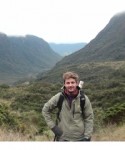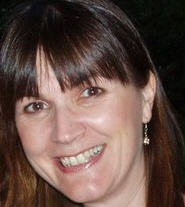I am a palaeoecologist at the Open University. My research involves reconstructing how our planet has changed over longer time scales in the past (1-2 million years). At first glance my research does not seem entirely relevant to current climate change but in fact it is integral. The climate system is hugely complicated and we still don’t fully understand how all the aspects work or how they interact together. One way of learning how the system operates is to simply observe it. The longer you observe it; then the better you will understand how it works and what are the possibilities for how it may change.
Events
JuxtaLearn – engaging students with science and technology through creative video performance
JuxtaLearn is a 3-year EU-funded project that has just passed the one-year mark and we are currently working to implement the technical aspects of the JuxtaLearn Process that we have developed.
In our presentation we give a little more detail about the challenges and findings from our first year. We showcase some of the videos made by the partners in the project to express their vision. One of these, the Teddy video, describes our efforts to come to a shared understanding of the project between the partners on the project, as well as introducing the workshops we held with teachers in school.
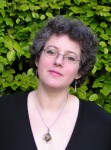
The goal of the JuxtaLearn Project is to enable students to overcome barriers to science and technology learning by exploring and sharing their understanding using creative video performance. By engaging student curiosity in difficult-to-learn science and technology subjects, the JuxtaLearn Process supports them along a creative route to a deeper understanding of topics that the teachers have identified as particularly problematic. The JuxtaLearn Process is illustrated, graphically, in Figure 1.
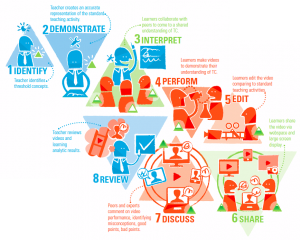
Fly us to the moon…
Engaging opportunties: Water rocket competition
In July 2013 five teams of six Year 9 students and one team of six Year 10 students from Slated Row Special School competed in a competition to launch water rockets. The teams, representing five schools from Milton Keynes, were judged on the distance the rockets flew, whether they could successful land an egg, and the design of their rockets.
The teams were supported on the day of the competition by Open University researchers, staff from Denbigh School and teachers from their home schools. The organising team included: Richard Holliman, Mike Bullivant, Vic Pearson, Kris Stutchbury, Peter Taylor, Mike Batham and me from the OU, and Andy Squires and Val Hawthorne from Denbigh School.
A panel of judges, including the Mayor of Milton Keynes Brian White and Professor Peter Taylor from the OU, assessed the entries. The team from Milton Keynes Academy were the winners, launching their rocket over 90m. They received a trophy, which was designed at Denbigh School. All the competitors received a replica of this trophy in the form of a key ring.
As Project Manager for the project I was responsible for the organisation from the Open University side of things, working closely with Val Hawthorne from Denbigh School.
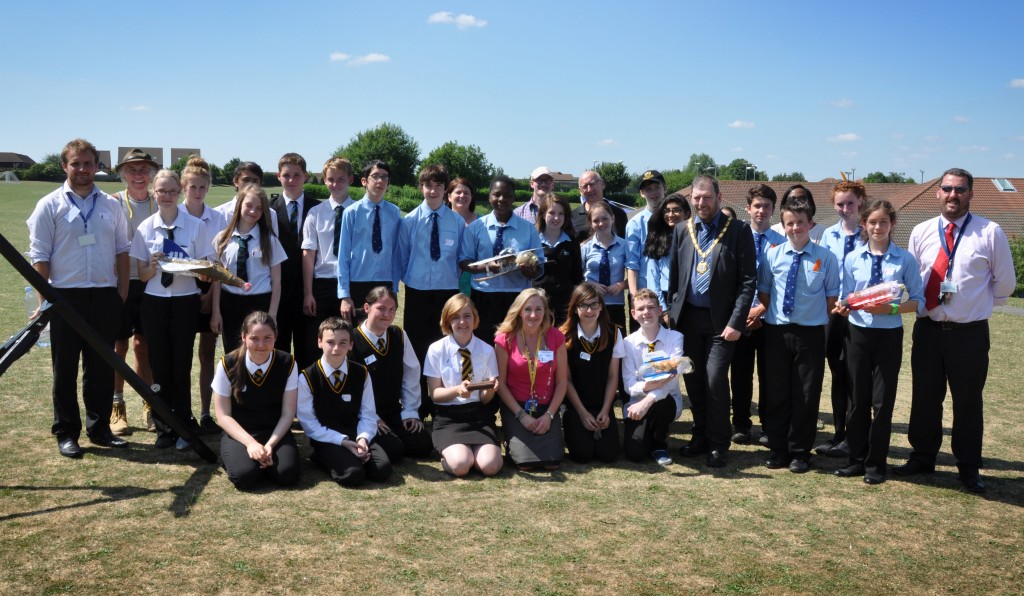
Communi-tea party at the academy

The academy and community: seeking authentic voices inside higher education - A workshop on creating and sustaining an engaged research community
On 11th November 2013, I facilitated a small workshop where participants explored some of the essential building blocks for creating and sustaining a research community that cultivates and delivers engaged academic practice. The session focused on features outlined in my research poster. A pdf of the poster, ‘COMMUNI-TEA PARTY AT THE ACADEMY’ can be downloaded – here.
Biology Week – a celebration of the biosciences
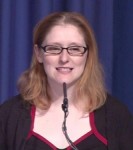
I was recently involved in the organisation of an event for local secondary school pupils for the Society for Biology’s ‘Biology Week’ initiative supported by The Physiological Society. The purpose of Biology Week is to celebrate all aspects of the biosciences. We set up a series of interactive displays and lectures and a dedicated online resource available through OpenLearn.
How to lose publics and alienate people

Social exclusion in public engagement with science
On Monday last week I gave a presentation as part of the ‘Engaging Research’ seminar series being run at the Open University (as you might have guessed since this is their blog!) The seminar series runs in conjunction with two RCUK-funded projects: 'An open research university'; and 'Engaging opportunities'.
My research interests are around who ‘counts’ as a public for so called ‘public’ engagement and how do engagement practices contribute to the exclusion of certain groups.
Green, gold and exploding books

Martin Hall, Vice-Chancellor of the University of Salford, came to the OU today to talk about the challenges and opportunities of open access publishing. This was part of Open Access Week at the OU.
The green and gold swamp of confusion
The mire of confusion around the green and gold models of open access – and which is ‘best’ – is trampled by many feet. Too long to rehearse here, I’d suggest a quick definition is that in ‘’gold’, the author pays to publish their work in an open access journal, and it is then instantly openly available. This raises the question of who pays the charges, of course. ‘Green’ open access relies on authors themselves archiving, in publicly-available repositories (such as the Open University’s ORO) a pre-publication version of work that they have published elsewhere.
Engaging opportunities: a research café on ‘smart drugs’
I recently took part in a Research Café at Denbigh School in Milton Keynes as part of the Engaging opportunities project. I’d been invited to take part as members of the project team were aware of my public engagement with research work.
The structure of the café was similar to the Café Scientifique events held across the country but instead of engaging members of the general public in scientific debate over a latté in the local coffee shop or bar, this event was held at the school with an audience of Year 12 students, sipping coffee and eating biscuits.
Why technology-enhanced learning needs engagement

Last Monday, I gave a talk on my research as part of the 'engaging research' seminar series associated with the RCUK funded Catalyst and SUPI projects. I explained why I think engagement is so important.
In my research, I try to identify the range of stakeholders in a given learning context that will be affected by the introduction of a technology. Through understanding the activities that the stakeholders are involved in, I try to develop technologies that will be used to facilitate learning without causing too much extra work for any individual stakeholder. By engaging, I hope to understand the stakeholders' perspectives and where possible collaborate with them to create something they will find useful.
Here's the video of the seminar along with the slides (including the cited references) and abstract...
Science in Public 2013
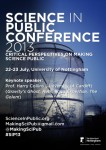
(with thanks to many prolific and interesting conference Tweeters)
This year was the seventh Science in Public conference and took place at the University of Nottingham, which is also the base for the Leverhulme Trust-funded Making Science Public project. There were over 120 participants from Austria, Brazil, Denmark, Germany, Ireland, Israel, Italy, Japan, Portugal, the United States and the UK and more than 25 panel sessions on topics from responsible innovation to storytelling and public engagement to the dilemmas of making expertise public.
Sophia Collins
@sophiacol
Come to my #SIP13 session on storytelling. Stories! A ukulele! And a week-old baby!

